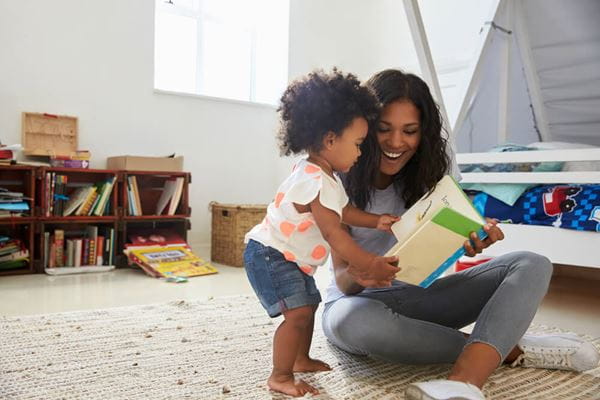Parents are busier than ever these days, and many only get a couple of hours with their children after work and before bedtime. If you find yourself with less time together than you’d like, be sure to make the most of it. One of the best activities you can do with a young child is reading aloud.
Why is reading important to children?
Study after study tells us that children who are read to from a very young age get a head start in life, setting them up to succeed.
Language and learning
Even if you take care to talk to your child throughout the day, reading books together can ensure that your little one is exposed to a greater number of words on many different topics. The results are improved language skills—both speaking and listening—which translate to improved performance in all areas of school later into childhood.
Nurturing
When you sit down with your child to read, it’s an opportunity to really be together. The one-on-one attention (and snuggles!) help to nurture the deep bond you share. It’s also a great way for you to relax and unwind at the end of the day.
Imagination and creativity
Reading a book together is just as entertaining as watching the television, but it’s more interactive and requires more imagination. The more stories your child hears, the more he expands the boundaries of his imagination and the better his critical thinking skills.
Social skills
It might be surprising to learn that being read to can help a child develop better social skills, but it’s true. Besides the benefits of interacting with a parent who’s reading to them, kids learn empathy from the characters in the story, as well as the ability to see situations from more than one perspective.
How to make reading routine
Try to make sure you carve out time every day to read to your child, even if it’s just a few minutes at bedtime. If you make it part of the daily routine, then you’re much more likely to keep at it. Tips:
- Try to let your child choose the book, though you may want to set out only a few to choose from, rather than the entire bookshelf.
- Mix it up – read silly books one day and do the voices of all the characters; the next day, choose more quiet, thoughtful books.
- Pay attention to the types of books (story, poetry, etc.) and the topics your child seems to like best and look for more books to add to your home library.
- Enjoy the moment and keep it fun. Don’t worry if your child becomes distracted and you aren’t able to read the whole book.




